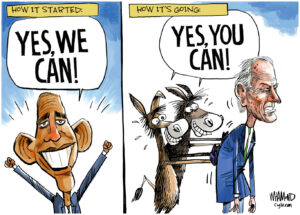EPA Prosecutions of Polluters Approach Quarter-Century Lows
The Justice Department filed just 75 EPA prosecutions in fiscal year 2019, down from a high of 198 in Bill Clinton’s second term. JPL NASA / Public Domain
JPL NASA / Public Domain
WASHINGTON — Criminal prosecution and convictions of polluters have fallen to quarter-century lows under the Trump administration’s Environmental Protection Agency, deepening three years of overall enforcement declines, according to Justice Department statistics.
And while the administration says it’s focusing on quality over quantity in pollution cases, using its enforcement resources to go after the biggest and worst offenders, an Associated Press analysis found little sign of that so far in court cases closed in 2019.
The criminal pollution cases initiated, and won this year, under the Trump administration, appear to be smaller one-offs, such as an Alaska fishing captain who let a reality TV show crew film his cheering crew as it dumped waste overboard into an Alaskan strait in 2017.
EPA spokeswoman Melissa Sullivan said Thursday it was “not unusual” for complex criminal cases to take years to move from initial investigations to filing of charges. Sullivan said that some statistics, such as a one-year rise from 107 to 133 in total number of defendants charged in criminal cases, were up in 2019.
“We have devoted substantial resources to larger, more complex investigations with more benefit to the environment and public health,” Justice Department spokesman Wyn Horbuckle said in a statement. “Such cases have resulted in billions of dollars in criminal penalties.”
But an environmental watchdog group and a former regional EPA criminal enforcement official said three years of falling enforcement numbers show the Trump administration gutting criminal investigations and prosecutions at the agency.
“These numbers in the last three years, what they show is the dismantling, intelligently, of this program,” said Michael Hubbard, a former special agent in charge for the EPA’s criminal investigation division in New England.
It’s the Trump administration “getting away with increasing the risk to health and the environment at the benefit of corporate officials who want to make more money,” Hubbard said.
“By any recognized metric, the odds of corporate polluters facing criminal consequences have reached a modern low,” stated Tim Whitehouse, a former EPA enforcement attorney and executive director of the Public Employees for Environmental Responsibility watchdog and advocacy group. “Every year under Trump has seen a further enforcement decline.”
The Trump EPA says its emphasis is on working with polluters to bring them into compliance with public health and environmental protections, but says it prosecutes when necessary.
Syracuse University’s Transactional Records Access Clearinghouse compiled the records from Justice Department and EPA cases for fiscal year 2019, which ended in September.
The EPA sent 190 cases to the Justice Department for possible criminal prosecution, the figures show. That’s up from 166 last year, the second year of the Trump administration, but otherwise the lowest since George H.W. Bush’s first term in 1990.
The Justice Department filed 75 EPA prosecutions in fiscal year 2019. That’s the lowest number since 1994, and down from a high of 198 in Bill Clinton’s second term.
Justice Department investigators won 60 federal convictions on pollution cases referred by the EPA, the fewest since 1995, according to the Syracuse University figures.
Convictions and settlements and sentences against big corporate offenders for fiscal year 2019 largely involved cases originated in the Obama administration but finished by the Trump administration, as with a $1.95 million penalty against Hyundai Construction Equipment Americas Inc. for importing diesel engines that fell short of U.S. clean-air requirements, the EPA’s summary of 2019 convictions and resolutions show. EPA started that investigation in 2015 after a whistleblower tip.
The EPA said some other enforcement categories showed gains for the year. That included 170 possible criminal cases opened by the EPA, up from 129 last year.
Criminal fines increased from $28 million in 2018 to $45 million, the agency said.
Conservation groups and former EPA officials, including Hubbard, say Trump administration cuts in enforcement agents at EPA are one of the biggest reasons for the criminal enforcement declines.
“It’s always resource-driven,” Hubbard said.
Even if the EPA is opting to focus its enforcement on the biggest cases it can manage, for enforcement officials, “if I got nobody in the store, I can’t sell any product,” Hubbard said.
The EPA had 145 investigative agents on staff as of February, down from 175 in 2012, Whitehouse, the PEER chief, said.
Scott Pruitt, Trump’s first EPA chief until scandals forced him from office, frequently pressed investigative agents into bodyguard duty for his unusual 24-hour protection detail.
Sullivan, the EPA spokeswoman, said the agency has 158 agents on staff now, and is hiring more.
The Trump EPA says it is putting more emphasis than previous administrations on working with polluters to bring them into compliance with public health and environmental protections but also prosecutes when necessary.
The administration’s argument that it’s focusing on getting the really big offenders is similar to that of the Obama administration, said Brett Hartl, government affairs director of the Center for Biological Diversity environmental group.
But even if big new criminal cases start popping up in the future to prove environmental investigators have been busy under the Trump administration, it might not be the safest policy, Hartl said.
If you’re a small- to average “polluter then you’ll go, ‘Oh, I’m just a small-time polluter,’’’ Hartl said. “What’s your incentive?” he asked. “’They won’t come after me.”
Your support matters…Independent journalism is under threat and overshadowed by heavily funded mainstream media.
You can help level the playing field. Become a member.
Your tax-deductible contribution keeps us digging beneath the headlines to give you thought-provoking, investigative reporting and analysis that unearths what's really happening- without compromise.
Give today to support our courageous, independent journalists.








You need to be a supporter to comment.
There are currently no responses to this article.
Be the first to respond.